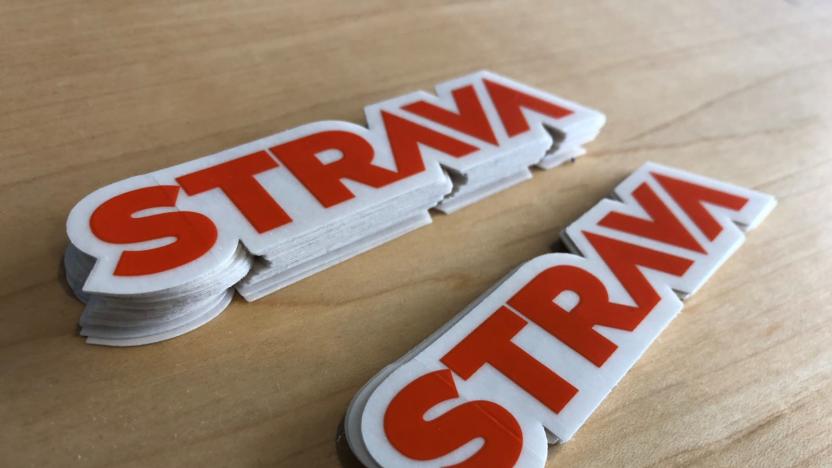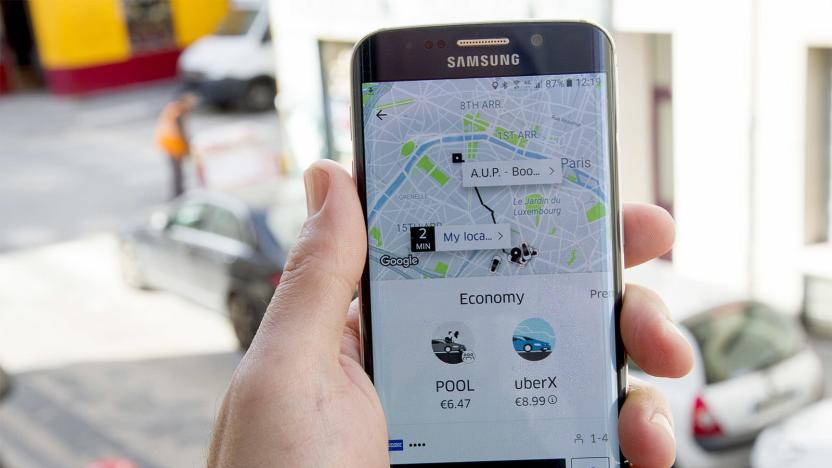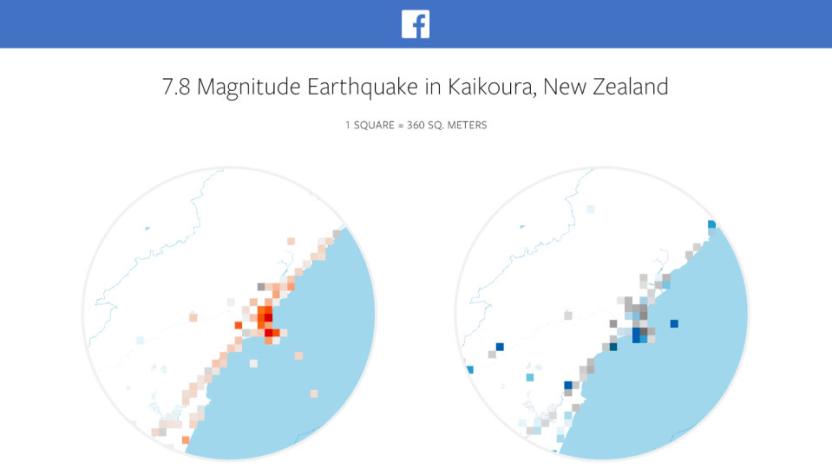locationtracking
Latest

Facebook used its AI smarts to build detailed disease prevention maps
Facebook has created highly detailed population maps to help health organizations, researchers and universities tackle disease outbreaks and plan public health campaigns. They focus on population density with demographic estimates, how people move and network coverage.

Bluetooth direction finding will locate your keys
Bluetooth's current location technology isn't particularly exacting. Its proximity features can tell you when you're close, but not which way to go -- and the position features are only accurate down to the meter level (about 3.3 feet), which can only help so much when a gadget falls between the couch seats. It's about to improve by leaps and bounds, however, The Bluetooth SIG has introduced direction finding support in its 5.1 standard to make location tech far more precise and overall useful.

Ajit Pai refused to discuss carrier tracking scandal with lawmakers
Lawmakers want to know why the FCC still allows mobile carriers to share their subscribers' location data with aggregators, but they won't be getting answers from its chairman anytime soon. Ajit Pai has refused to attend an emergency briefing requested by the Committee on Energy and Commerce chief Rep. Frank Pallone. The committee head was hoping to discuss the phone location tracking scandal that blew up last week. If you'll recall, a Motherboard reporter was able to get someone's real-time location from a bail bond agent for just $300, and that information came from a company that purchases data from mobile carriers.

How Google’s location-tracking issue affects you
Watching Twitter and Facebook commit reputational suicide over the past 20 months has been as painful as it has been entertaining -- entertaining in the sense that all anyone had to do was let the companies be themselves. The cost has been terrible, on democracy, the free press, at-risk populations and soon, I'll wager, on the economy. Still, it's hard not stay glued to our screens, waiting to see what awful things Facebook and Twitter do to us next. While we've been perversely absorbed by the epic-scale human rights incompetencies of Facebook and Twitter (and trying not to get, you know, murdered, jailed or exiled as a byproduct of the platforms), we kind of forgot about some of the other born-yesterday stewards of humanity. Like Google. Which has apparently been playing fast and loose with the whole "we don't track your location" thing.

After exposing secret military bases, Strava restricts data visibility
At the end of January, an analyist discovered that location data from the fitness app Strava was exposing US military bases. Publicly-available heatmaps were revealing details about the military's installations abroad, which riled up both privacy experts and the Pentagon. Over a month later, the app's company told Reuters that it will overhaul its heatmap and restrict access to street-level details to anyone who isn't a registered user.

Strava simplified how to opt out of its heat map data collection
In January, Strava came under fire for its activity heat map, which showed the locations of military bases in places like Afghanistan, Syria and Somalia. You could even see details like user routes named "Base Perimeter" and "Sniper Alley" near US bases in Iraq and Afghanistan. While Strava did offer the option for its users to opt out of its heat map data collection, many pointed out that doing so required some navigation through the app and was a process that wasn't very straightforward. But Strava recently updated its app and has quietly changed the opt-out process.

Strava’s fitness heatmaps are a 'potential catastrophe'
The 2018 cybersecurity race to the bottom is off to an exciting start. First out of the gate is Strava — now widely known as the "social network for athletes" -- and its reckless data-visualization "heat map" gimmick that revealed details of secret military bases around the world. It was the kind of incident deserving of a plot line in a ridiculous Hollywood drama. And yet, here we are, with Twitter and the whole world discussing and dissecting fitness routes of soldiers and agents in sensitive locations, such as American bases in Afghanistan and Syria, a possible secret CIA base in Somalia, military facilities in war zones and much more.

Pentagon reviews policy after fitness app reveals military locations
Yesterday, reports surfaced that a heat map released by fitness app company Strava showed the locations of US and other countries' military. While most of the locations spotted, including Afghanistan and Syria, are known to host US military bases, it still highlights the fact that information the Department of Defense would prefer remain under wraps could find its way out into the open. It also demonstrates that fitness apps could pose a security threat if location information isn't correctly handled. Now, Reuters reports, US Defense Secretary Jim Mattis has ordered a review of the situation.

Uber kills plans to track passengers after their trips
Following criticism by consumers and privacy groups, Uber will change an app setting that lets it track you after a trip ends, company security chief John Sullivan told Reuters. Back in December, it stopped allowing users to limit tracking to "while using" the app, offering only "always" or "never" location tracking options. A new clause stated that "always" meant it could track you for up to five minutes after a ride ended, even if you weren't using the app.

Facebook's new maps will help responders during natural disasters
When natural disasters hit, the role of a site like Facebook switches from a fun social networking platform to a tool that can be used to save lives. Fully aware of the role it plays in natural disasters, Facebook has today announced that it will be using its software to lend emergency services a helping hand.

TrackR's home-mapping plugs help you pinpoint lost items
Even in the tiniest of apartments, your most precious possessions somehow vanish when you need them most. In a bid to make messy people slightly less late, TrackR has announced a new range of item locator tags. The TrackR pixel tag is its new keyring-like device, allowing you to track any item within your home or beyond. The company has switched from aluminum to plastic, meaning that the pixel is cheaper than its predecessor. In addition, the device gains an LED light that'll help you find it in the dark.

Facebook knows when you visit a store because of its ads
Facebook's already offering retailers ways to convert ad views into sales online, but now it has a way to see if those views generate in-store traffic. To gauge how effective a retailer's ads are in getting folks to make a trip to a physical location, Facebook will track when users visit a shop after seeing its ad on the social network. The company says that the numbers are an estimate though, based on if the user has location service enabled on their mobile device. That feature is rolling out "over the coming months."

DARPA is working on something way better than GPS
When your location marker on Google Maps is pinging all over the place, it's usually due to temperamental GPS signal. DARPA thinks this isn't cutting it anymore, and is developing a "radically" new tech that will offer real-time position tracking -- something that'll work despite blind spots or jamming efforts. DARPA expects this will offer a huge boon to the US Military over, well, everyone else. Beyond war, the new location tech will be good for some much more, and will be far more flexible than GPS. Just like how we now use that once-military network for navigation and location services, new tech is very likely drip down to muggles like us too.

Apple: iPhone tracking lawsuit doesn't demonstrate harm
Remember when a group of plaintiffs decided to sue Apple, alleging that the company was allowing free apps from the App Store to gather geographical location information without their consent? Well, Bloomberg reports that Apple was in US District Court in California on Wednesday, asking Judge Lucy Koh to deny a request from plaintiffs' counsel to have the case turned into a class-action suit. Apple says that the plaintiffs haven't proven that any tracking that did take place actually resulted in harm to them. The lawyers for the plaintiffs have also dropped their claims to damages, which Apple views as proof that they're only trying for class-action status in order to recover legal fees. The lawsuit revolved around the ability of apps to have access to an iOS device's unique device identifier (UDID), allowing ad agencies to capture usage data across apps. Apple now restricts UDID access by app and is actually rejecting some apps that still use the code. [via Apple Insider]

Asher Levine's fall 2013 fashion line goes future forward
Children of the '80s, you'll want to remember this name: Asher Levine. He's the young designer behind an also young label poised to make Marty McFly's vacuum-powered jacket from Back to the Future Part II a real-life retail item. But more on that in a bit. As you might've already guessed, Levine's brand is atypical of the industry, one based upon the incorporation of technology and innovation with style. It sounds strange when you consider this is fashion we're talking about -- a notoriously stodgy industry predicated upon its historical archives -- but then again, this is the very same designer that teamed up with MakerBot for his fall 2012 collection. Oh, and did we mention he dresses the likes of Lady Gaga and will.i.am? There's that, too. While that last crossover collaboration employed MakerBot's Replicator for 3D-printed eyewear, Levine's current fall / winter 2013 line is taking things into a less cumbersome, more practical realm. Through a partnership with Phone Halo, a company focused on mobile Bluetooth solutions, apparel in this new collection will feature integrated tracking chips to help high-end clientele locate lost or misplaced luxury items via a customized TrackR app. So forget about last season's trends, Levine is committed to pushing things forward, while also daring to dream a little sci-fi dream.

Cisco acquires WiFi data firm ThinkSmart Technologies
Networking kingpin Cisco announced on Wednesday that it had acquired ThinkSmart Technologies, a company that analyzes location data by using WiFi technology. ThinkSmart's tech reviews a network's infrastructure by evaluating the movement of its users, traffic patterns and hours of operation. The firm then uses these analytics to help companies optimize network and staffing configurations for business operations -- a long way of saying that it's smart enough to tell a company how to better manage information flows through a network. The terms of this deal have yet to be released, but Cisco seems to think this was a smart pick up.

Nokia experiments with location-based white space services in Cambridge, UK (video)
Following news of the first successful white space trials in Cambridge, UK, Nokia is now touting its research in the area with a demonstration of location-based services for the unlicensed spectrum. Traditionally, proponents of white space usage have positioned this unused portion of the airwaves as a viable, low-cost method of data transmission, but the Nokia folks have now demonstrated its ability to pinpoint one's location with much greater accuracy than either WiFi or cellular networks. Think of it as a counterpoint to NFC, if you will, but in the following clip, we're shown how an individual might move throughout a museum, and as they approach various exhibits, one's smartphone could provide supplemental information for the nearby artifacts. Beyond its use in museums, Nokia also foresees the technology as useful in the retail space, where businesses may provide consumers with promotions as they walk by. Currently, the necessary equipment to make this all possible is much too large to fit within a typical smartphone, but Nokia hypothesizes that the necessary chipsets and industry standards may be in place by 2015. Until then, you can dream of what might be with the following video.

T-Mobile updates FamilyWhere location tracking service for worrisome parents
It was never intended as such, but The Rolling Stones' song Under My Thumb could easily pass as the anthem of overbearing parents across the globe. Now, T-Mobile is tossing its paranoid constituents a bone with an updated version of its FamilyWhere lineup. First onto the platform is FamilyWhere Check In, a free app that lets kids manually send their location to family members, which is delivered as a web link within a text message. The carrier's more robust application, known as FamilyWhere Locate, is a $10/mo subscription service that automatically provides location tracking for up to ten devices. Here, doting parents (and untrusting spouses) can keep tabs on their family via a web browser or the FamilyWhere app, and may choose to have regular location updates delivered via SMS or email. Now all you have to do is slap DriveSmart onto your kids' phones, and they're certain to resent you forever.

BiKN for the iPhone hands-on (video)
We don't know about you, but we're pretty prone to losing stuff -- everything from our precious phones, to our keys to, occasionally, our fellow bloggers. BiKN is a hardware and software-based solution that allows you to track you loved ones and things using simple 802.15.4 radio tech instead of battery-sucking GPS. The two hardware components that will be shipping later this month are an iPhone case, which connects through the 30-pin connector and tags which you can attach to keys, bags, or the belts of wandering children. You can leash items to you using the free app so that an alarm will sound -- on both ends if the person or item wanders out of a particular range. You can also simply ping them if you've misplaced them. It even simply measures how far away another phone or tag is. And, since it's a two way system with a battery integrated in the case, if you lose your iPhone and the battery is dead you can still find it using one of the tags. A package containing the case and one tag will be available for $100, while a kit with two tags will retail for $120. Additional tags can be purchased in packs of two for $50. Check out the gallery below and the video after the break. Mat Smith contributed to this report.

Sprint issues OTA fix for HTC Android handset vulnerability
Earlier this month, we found out that after a software update HTC's Android handsets had a serious security flaw -- any app could gain access to user data, including recent GPS locations, SMS data, phone numbers, and system logs. To its credit, HTC responded quickly to the security issue, and now an OTA update with the fix is going out to those on the Now Network. Sprint users with an EVO 4G, 3D, Shift 4G, Design 4G or View 4G can get the download, as can Wildfire S owners. The patch available now for a manual download, and more info on the fix can be found at the source below. [Thanks, Korey]















